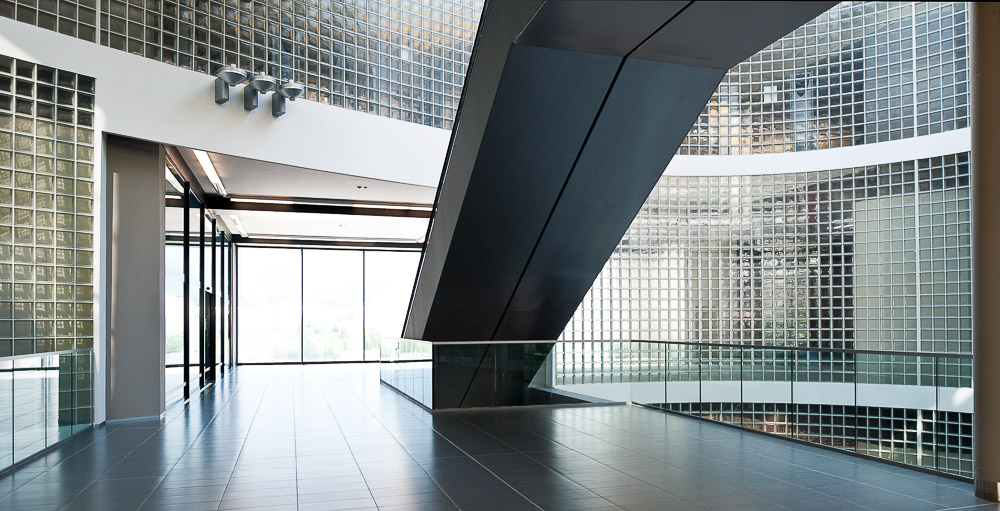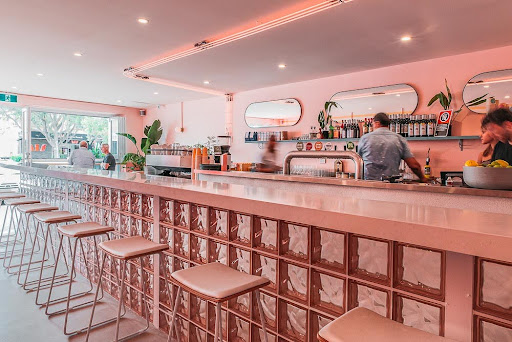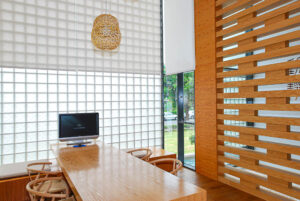Glass Block is a versatile building material made of glass. It is available in a variety of sizes, colors, patterns and performance capabilities, and is used in building facades, windows, walls and other applications such as showers, partition walls or accent pieces. The main difference between glass block and glass brick, is that glass block is hollow, whereas glass brick is solid. The air pocket makes glass block a better insulator, and less heavy as well.
You may associate the aesthetics of glass block with ArtDeco buildings or industrial facilities since, in the past, this was where they were mostly used. However, more and more contemporary architects are incorporating glass block into their building design in uniquely modern ways because of its sheer beauty as well as its high functionality.
History of Glass block
As mentioned above, glass block is not a new building material; the first hollow glass block was patented way back in 1886 by Gustave Falconnier. But glass block really only caught the American imagination in 1933 when the Owens-Illinois Glass Company introduced their new product – glass block – by constructing a building made entirely of glass block for the Chicago Century of Progress Exhibition. That heralded the first golden era of glass block that spanned the 30s and 40s. This was the time of glamorous ArtDeco and Streamline Moderne style buildings that are currently making a resurgence, albeit in a more modern form. Could we be in the middle of the second golden era of glass block? One only needs to look at some of the recent glass block architectural marvels to see the potential of glass block.
Other early manufacturers of glass block, beside the Owens-Illinois Glass Company, were Pittsburgh Corning and Seves Glass Block Inc. Seves is the only company out of the three that is still in existence, and this is the glass block that we carry here at Quality Glass Block.

Glass Block Qualities
Besides, its unique aesthetic, glass block was and still is prized for its functional properties, namely it is:
- Strong and durable
- Fire, sound, vandal and extreme weather resistant
- Secure
- Allows for privacy while still transmitting light
- Easy to maintain
- Sustainable and energy efficient
How is Glass Block Made?
Glass block has superior thermal capabilities because it is hollow. It is made by melting a mixture of silica sand, soda ash and limestone to 2,300 degrees Fahrenheit. A precise amount of the molten glass is then pressed into a half block mold. Two halves are sealed together, creating a partial vacuum and then slowly cooled to remove any internal stresses and strengthen it. The edges are then bonded together with polyvinyl butyral which also allows for expansions and contraction. Each block is tested for clarity and consistency. The lifespan of installations made with glass block is well over 50 years, much longer than your typical glass product.
Any hollow glass block will refract light as it travels through the glass and air, exhibiting a degree of distortion that adds a unique visual effect to any structure made with it. Different glass block patterns will further distort the light, providing more or less privacy. For example, the Opal pattern offers maximum privacy, while cross ribbed provides medium privacy and a clear pattern results in minimal privacy.

Glass Block at Quality Glass Block
While the general process of making glass block is universal, glass block can be made thicker, or have various coatings applied that will affect its performance. For instance, The Thinline series is a 3 inch glass block, while a standard glass block is usually 4 inches thick. As to performance glass block, we carry glass block with a fire rating of 60 or 90 minutes, a super efficient energy block and much more!
How to Install Glass Block
Glass block is not load-bearing; it can only carry the load of its own weight. So if a panel is inserted in an opening, steps must be taken to support the structure above.
There are three options for installation: installation with mortar, mortarless installation and prefabricated panels or windows. Mortarless installations are great for indoor partition walls, accent pieces such as kitchen islands or bars, or showers. For outdoor projects, we recommend using mortar since mortar is more weather resistant.
Use Glass Block in Your Next Project
When you’re planning your project, give us a call and we can provide specific guidance on the glass block and installation systems that will work best for what you are picturing in your mind.





Give us a follow!